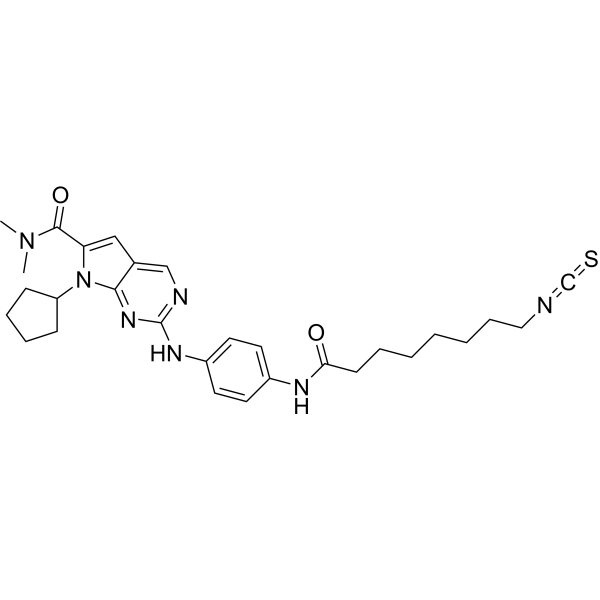Physicochemical Properties
| Molecular Formula | C29H37N7O2S |
| Molecular Weight | 547.714784383774 |
| Exact Mass | 547.272 |
| CAS # | 2369981-71-3 |
| PubChem CID | 138911336 |
| Appearance | Light yellow to yellow solid powder |
| LogP | 6.1 |
| Hydrogen Bond Donor Count | 2 |
| Hydrogen Bond Acceptor Count | 7 |
| Rotatable Bond Count | 13 |
| Heavy Atom Count | 39 |
| Complexity | 838 |
| Defined Atom Stereocenter Count | 0 |
| SMILES | S=C=NCCCCCCCC(NC1C=CC(=CC=1)NC1=NC=C2C=C(C(N(C)C)=O)N(C2=N1)C1CCCC1)=O |
| InChi Key | LLMKBTGLZJIAMY-UHFFFAOYSA-N |
| InChi Code | InChI=1S/C29H37N7O2S/c1-35(2)28(38)25-18-21-19-31-29(34-27(21)36(25)24-10-7-8-11-24)33-23-15-13-22(14-16-23)32-26(37)12-6-4-3-5-9-17-30-20-39/h13-16,18-19,24H,3-12,17H2,1-2H3,(H,32,37)(H,31,33,34) |
| Chemical Name | 7-cyclopentyl-2-[4-(8-isothiocyanatooctanoylamino)anilino]-N,N-dimethylpyrrolo[2,3-d]pyrimidine-6-carboxamide |
| HS Tariff Code | 2934.99.9001 |
| Storage |
Powder-20°C 3 years 4°C 2 years In solvent -80°C 6 months -20°C 1 month |
| Shipping Condition | Room temperature (This product is stable at ambient temperature for a few days during ordinary shipping and time spent in Customs) |
Biological Activity
| Targets | CDK9/cyclinT1 11 nM (IC50) CDK4/cyclin D 148 nM (IC50) CDK6/cyclinD 145 nM (IC50) |
| ln Vitro | With IC50 values less than 0.5 µM, CDK9-IN-7 exhibits remarkable activity against NSCLC cell lines, particularly A549 and H1299. With an IC50 value of 0.837 µM, CDK9-IN-7 also shows good inhibitory potency in the drug-resistant NSCLC cell line H1975[1]. |
| References |
[1]. Novel cyclin-dependent kinase 9 (CDK9) inhibitor with suppression of cancer stemness activity against non-small-cell lung cancer. Eur J Med Chem. 2019 Jul 25;181:111535. |
Solubility Data
| Solubility (In Vitro) | DMSO : 62.5 mg/mL (114.11 mM) |
| Solubility (In Vivo) |
Solubility in Formulation 1: ≥ 2.08 mg/mL (3.80 mM) (saturation unknown) in 10% DMSO + 40% PEG300 + 5% Tween80 + 45% Saline (add these co-solvents sequentially from left to right, and one by one), clear solution. For example, if 1 mL of working solution is to be prepared, you can add 100 μL of 20.8 mg/mL clear DMSO stock solution to 400 μL PEG300 and mix evenly; then add 50 μL Tween-80 to the above solution and mix evenly; then add 450 μL normal saline to adjust the volume to 1 mL. Preparation of saline: Dissolve 0.9 g of sodium chloride in 100 mL ddH₂ O to obtain a clear solution. Solubility in Formulation 2: ≥ 2.08 mg/mL (3.80 mM) (saturation unknown) in 10% DMSO + 90% Corn Oil (add these co-solvents sequentially from left to right, and one by one), clear solution. For example, if 1 mL of working solution is to be prepared, you can add 100 μL of 20.8 mg/mL clear DMSO stock solution to 900 μL of corn oil and mix evenly. (Please use freshly prepared in vivo formulations for optimal results.) |
| Preparing Stock Solutions | 1 mg | 5 mg | 10 mg | |
| 1 mM | 1.8258 mL | 9.1289 mL | 18.2578 mL | |
| 5 mM | 0.3652 mL | 1.8258 mL | 3.6516 mL | |
| 10 mM | 0.1826 mL | 0.9129 mL | 1.8258 mL |
